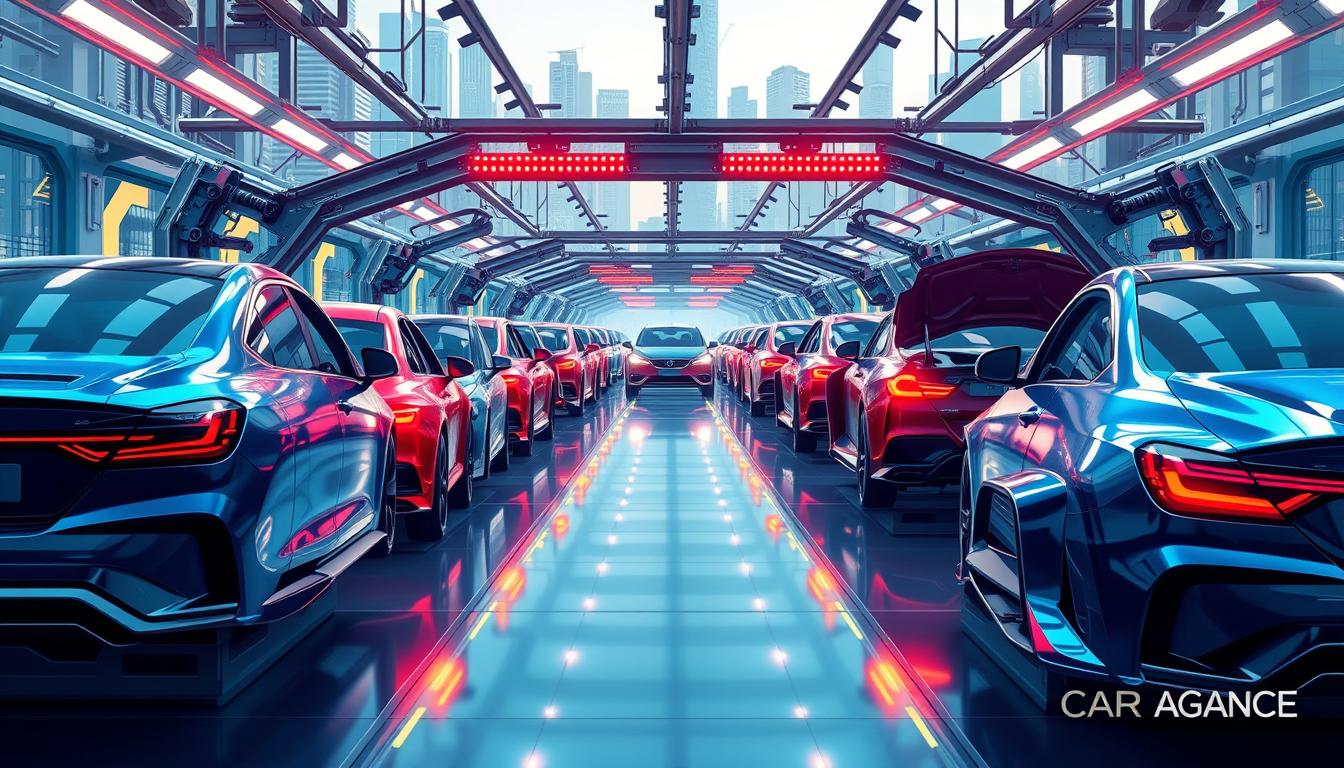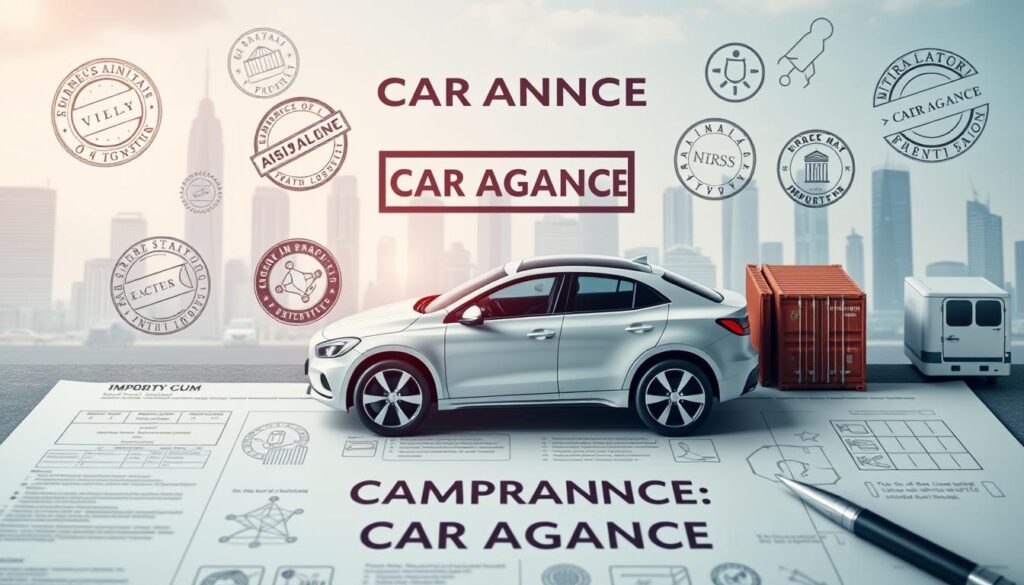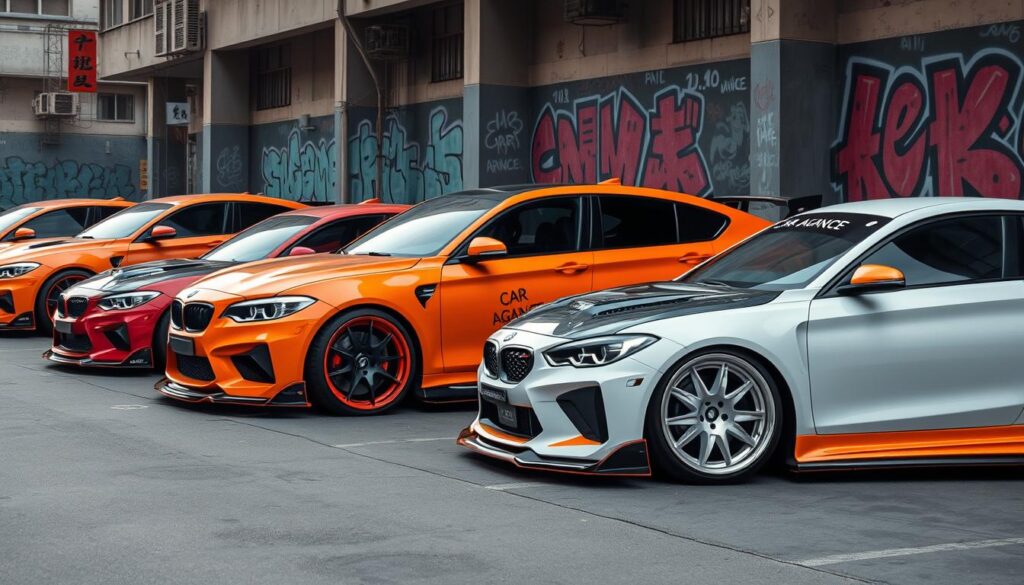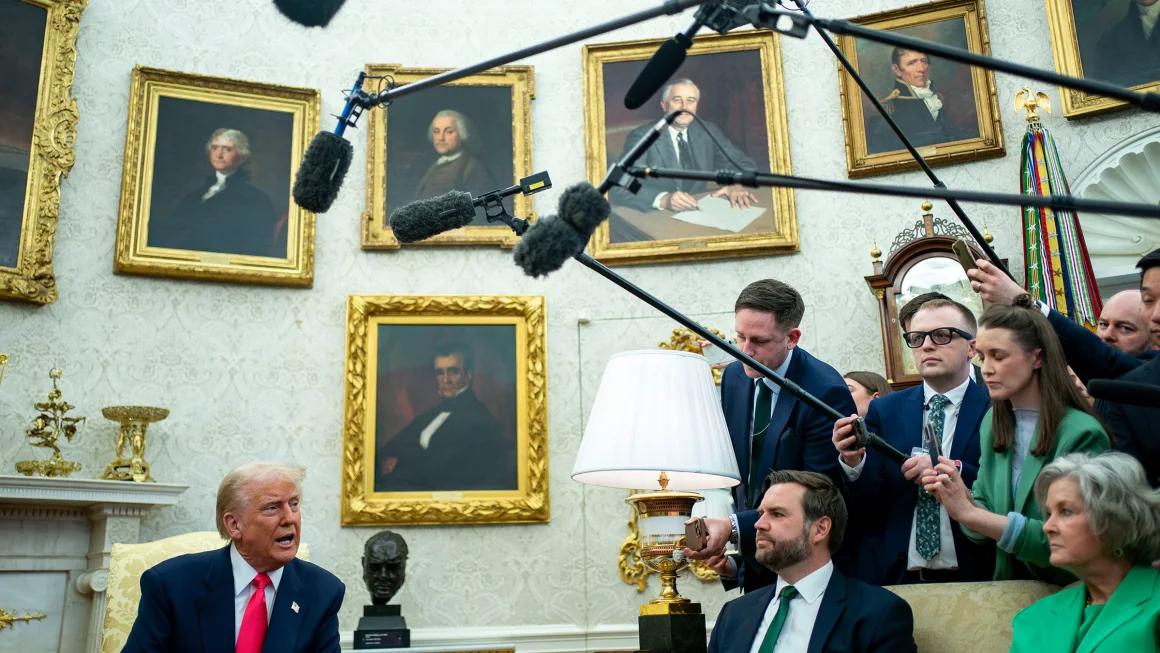
Are you curious about Chinese cars and car modification? Chinese cars are becoming popular worldwide. They are affordable and innovative, attracting car lovers everywhere. But why are they so appealing, and how can you customize them?
Chinese car makers are making big moves, especially in electric vehicles (EVs). By 2024, they expect to sell a quarter of all EVs in Europe. Cars like the BYD Atto 3 and MG4 are leading the way with their tech and prices.
BYD, from Shenzhen, is even opening a factory in Mexico. They plan to make affordable EVs like the Dolphin and Seagull. These cars will cost around $23,600 and $11,000, respectively.
But Chinese cars face challenges in some markets. In the U.S., they have a 27.5 percent tariff. EVs from China also miss out on a $7,500 tax credit. Yet, cars like the Envision are proving to be top-notch, according to Consumer Reports.
Modifying Chinese cars is a growing trend. People are adding body kits, vinyl wraps, and improving performance. The scene is filled with enthusiast groups, famous modifiers, and workshops for customizing.
Key Takeaways
- Chinese automakers are gaining global popularity for their affordable and innovative vehicles, especially in the EV segment.
- Models like the BYD Atto 3, MG4, and XPeng G9 are making waves in the European market.
- Chinese cars face challenges in the U.S. market due to tariffs and ineligibility for federal tax credits.
- Modifying Chinese cars has become a thriving subculture, with enthusiasts exploring various customization options.
- The Chinese car modification scene is supported by enthusiast communities, influential modifiers, and dedicated workshops.
Introduction to Chinese Automotive Industry
The Chinese car industry has grown a lot in recent years. It has become the biggest car market in the world. From 2004 to 2014, the number of cars in China went up by 21.69% every year.
This growth is because more people want cars and the middle class is getting bigger. Now, China has 123.27 million civilian passenger vehicles.
Chinese car makers are split into two groups. There are those that make cars on their own and those that work with foreign companies. Companies like Volkswagen and Toyota have joined forces with Chinese makers.
These partnerships have helped a lot. They brought new technology and skills to China’s car industry.
History and Growth of Chinese Car Manufacturers
The Chinese car industry started in the 1950s with help from the Soviet Union. But it really took off in the 1980s. In 1984, Japan’s car exports to China jumped from 10,800 to 85,000.
Since then, the industry has grown fast. By 2009, China became the biggest car market in the world. In 2010, it produced and sold over 18 million vehicles, a record.
The growth kept going. In 2017, China made 30.19% of the world’s cars, producing 28.879 million vehicles.
| Year | Total Civilian Passenger Vehicles Owned (in millions) |
|---|---|
| 2004 | 17.35 |
| 2014 | 123.27 |
Popular Chinese Car Brands and Models
China has many car brands and models for different needs. Some top brands are:
- BYD
- MG (owned by SAIC)
- Geely
- Chery
- Great Wall Motors
These brands offer many models, from electric cars to luxury SUVs. موردي قطع غيار السيارات help these brands by providing quality parts.
“The Chinese automotive industry has shown great strength and ability to change, always adapting to what people want and using new tech.”
As the Chinese car industry grows, it’s getting noticed by car lovers all over. Chinese car makers focus on being innovative, making quality cars that are affordable. They are set to shape the future of cars and make a big impact globally.
Advantages of Owning a Chinese Car
Chinese cars have become very popular lately. They offer great value, quality, and unique features. The Chinese car industry is growing fast, giving buyers many choices.
Affordability and Value for Money
Chinese cars are known for being affordable. They pack lots of features at prices that are hard to beat. For example, the Seagull electric car by BYD costs about $12,000 in China. There’s even a version for under $10,000.
Improved Quality and Safety Standards
Chinese car makers have worked hard to improve their cars. Models like the Buick Envision and Polestar 2 have done well in tests. This has made people trust Chinese cars more.
Unique Designs and Features
Chinese cars stand out with their innovative designs and features. They offer unique touches that appeal to Chinese buyers. These buyers are open to trying new things, unlike some in other countries.
| Brand | Model | Price (USD) | Range (miles) |
|---|---|---|---|
| BYD | Seagull | $12,000 | 252 |
| BYD | Seagull (short-range) | $10,000 | N/A |
| BYD | Seal (France) | $50,000 | N/A |
Chinese car makers are leading the electric vehicle (EV) charge. They’ve moved faster than joint ventures to adopt EVs. Thanks to government help and a focus on improving, Chinese EVs are becoming a popular choice for those wanting green and affordable cars.
Common Misconceptions about Chinese Cars
Despite big steps forward in the Chinese car industry, some people still doubt the quality and safety of Chinese cars. These doubts often come from old reports of bad crash test results and worries about stolen designs. But, Chinese car makers have really improved, with many models now passing tough safety tests in Europe and the US.
Many think Chinese cars don’t have the safety features or do well in crash tests. But, Chinese car makers have really worked on making their cars safer. Now, many cars have airbags, ABS, and ESC, among other safety features.
Another wrong idea is that Chinese cars are not as good as Western ones. This might have been true before, but Chinese car makers have really stepped up their game. Now, many Chinese car brands offer cars that are as good as, if not better than, well-known global brands.
It’s important to judge each Chinese car on its own, not just because of where it’s made. With the fast growth of the Chinese car market, there are many high-quality, affordable cars to choose from. These cars meet different needs and tastes.
| Misconception | Reality |
|---|---|
| Chinese cars lack safety features | Many models now come with advanced safety features |
| Chinese cars are of inferior quality | Significant improvements in build quality and reliability |
| Chinese cars are not suitable for international markets | Many models meet stringent safety standards in Europe and the US |
As the Chinese car industry keeps growing and getting better, it’s key for buyers to stay open-minded. By clearing up common myths and seeing the progress Chinese car makers have made, buyers can make smart choices. They can enjoy the value and new ideas that Chinese cars offer.
Importing and Purchasing Chinese Cars
More people are looking at Chinese cars as the auto industry in China grows. But, it’s hard to navigate the rules and restrictions for importing them. We’ll look at how to import Chinese cars and where to buy them.
Regulations and Import Restrictions
There are big hurdles to importing Chinese cars to the U.S. There’s a 27.5% tariff on them, and some want to ban them. Electric cars made in China also miss out on a $7,500 tax credit. To avoid tariffs, some makers, like BYD, are starting to make cars in Mexico.

Importing a Chinese car comes with extra costs. You’ll need to pay for licensing, registration, and shipping. You’ll also need insurance to drive in most U.S. states. There’s no special deal for car imports between the U.S. and China.
Dealerships and Online Marketplaces
There are many places to buy Chinese cars. Some dealerships focus on imported cars, including Chinese ones. They offer a wide range of models, from affordable to luxury.
Online marketplaces are also a good choice. They let you look at many cars from home. Chinese cars are often smaller, perfect for city driving. Always check the seller’s reputation and read reviews before buying online.
Chinese car makers are working to sell more globally. Lotus plans to make cars in Wuhan for China and Asia. They’ll make cars for Europe and North America in Hethel. This way, they can meet local tastes better.
When buying a Chinese car, do your homework. Work with trusted dealerships and online sites. Knowing the rules and options helps you find the right car for you.
Chinese Car and Ways to Modify Them
The Chinese car industry is growing fast. Car lovers are finding cool ways to make their cars special. They can choose from many upgrades to show off their style.
Aesthetic Modifications and Body Kits
Many people like to make their Chinese cars look better. They add body kits, custom wheels, and special paint jobs. These changes make their car look unique and stand out.
- Custom body kits
- Aftermarket wheels and tires
- Unique paint jobs and vinyl wraps
- Spoilers and wing additions
- Upgraded lighting systems
Performance Upgrades and Engine Tuning
Some people want their Chinese cars to go faster. They can tune the engine or change the suspension. These changes make the car more powerful and fun to drive.
| Upgrade | Benefits |
|---|---|
| High-performance exhaust systems | Improved exhaust flow and enhanced sound |
| Upgraded brakes | Better stopping power and control |
| Performance air filters | Increased airflow for better engine performance |
| Turbocharger or supercharger installations | Significant power gains |
Interior Customization and Accessories
People also like to make their car’s inside their own. They can add new sound systems, upholstery, and trim. This lets them make their car feel just right for them.
- Custom leather or fabric upholstery
- Aftermarket sound systems and speakers
- Upgraded infotainment systems
- Ambient lighting installations
- Custom steering wheels and shift knobs
Modifying my Chinese car has been an incredible journey of self-expression and creativity. It’s not just about improving performance or aesthetics; it’s about making the car truly my own.
The Chinese car modification scene is getting bigger. People are showing off their unique styles with their cars.
Chinese Car Modification Culture
China’s car modification scene is vibrant and growing. Enthusiasts from all walks of life come together to celebrate their passion for customizing vehicles. Despite legal restrictions, the culture thrives, with enthusiasts pushing for legalization and showing a rebellious spirit.

The Chinese car modification market was valued at about $15 billion in 2020. It grew by 20% annually, according to the China Association of Automobile Manufacturers (CAAM). By 2025, it’s expected to reach $25 billion, showing the increasing demand for customized vehicles.
Enthusiast Communities and Events
Chinese car enthusiasts have formed close communities. They organize events to showcase their modified vehicles. The GT Show, for example, featured a wide range of customized cars.
These included classic Porsche 917/20 Pink Pig-inspired liveries and unique concepts like lifted safari-style Porsche 986s. The event also showcased supercars like the Mercedes-Benz SLS and the McLaren P1 with a GTR kit.
- Mercedes-Benz SLS
- McLaren P1 with a GTR kit
- Lamborghini Aventador with a Liberty Walk kit
- Ferrari FF
- Aston Martin Vantage GT3 race car
Online forums and social media platforms connect enthusiasts and share knowledge. The “Fast and Furious” franchise has greatly influenced the car modification culture in China, leading to a surge in enthusiasts.
Influential Modifiers and Workshops
Influential modifiers and workshops have gained recognition for their unique creations and technical expertise. They often collaborate with automakers and aftermarket brands to develop new products and styles. The Chinese car modification culture is influenced by the Japanese modifying scene, with bippu (VIP) style being particularly popular.
| Workshop | Specialty | Notable Creation |
|---|---|---|
| RAUH-Welt Begriff (RWB) | Wide-body Porsche modifications | At least five RWB creations at the GT Show |
| Liberty Walk | Wide-body kits for various makes and models | Lamborghini Aventador with a Liberty Walk kit at the GT Show |
| Unnamed Workshop | Stance-style modifications | Wide-body Tesla Model 3 attracting significant attention at the GT Show |
As the car scene in China evolves, enthusiasts push the boundaries of creativity and innovation. They showcase their passion for improving and personalizing vehicles. Despite legal challenges, the culture remains resilient, with a bright future ahead as the market grows and enthusiasts advocate for legalization.
Challenges of Modifying Chinese Cars
Modifying Chinese cars can be exciting for enthusiasts. But, it’s important to know the challenges. Finding the right parts can be hard because of unique specs and limited options.
China’s auto-parts industry has grown a lot since 2004. Over 10,000 registered manufacturers and 15,000 unregistered ones exist. Yet, the industry is still small compared to the U.S. and the world.
Legal Considerations and Warranty Issues
Modifying Chinese cars also comes with legal and warranty challenges. Chinese law is strict about car modifications. It’s crucial to follow the rules to avoid legal trouble.
Before making any changes, research local laws and talk to experts. Big modifications can void your warranty. This means you’ll have to fix any problems yourself.
| Year | Chinese Auto-Parts Industry Revenue (Billion USD) | Annualized Growth Rate |
|---|---|---|
| 2005 | – | – |
| 2009 | $136.5 | – |
| 2010 (Projected) | $195.31 | 23.2% (since 2005) |
As more people want to modify their cars, the market gets more competitive. It’s key to be careful and do your homework. By researching and consulting experts, you can overcome the challenges and enjoy your modified car.
Maintenance and Repair of Chinese Cars
Chinese cars are becoming more popular worldwide, including in the United States. It’s important to have reliable maintenance and repair services. Specialized dealerships and independent workshops are now available to help with these needs.
These places offer expertise in fixing specific issues with Chinese cars. The industry’s revenue has grown by 5.8% each year since 2014. By 2024, it’s expected to reach $109.4 billion.
This growth is due to more cars on the road and higher living standards in China. Online communities also help Chinese car owners. Here, people share tips and advice on car care and troubleshooting.
As the Chinese car industry grows, more aftermarket parts and skilled technicians will be available. This will make it easier for owners to keep their cars in good shape. The car parts market in China is expected to keep growing over the next five years.
The car repair services industry mainly focuses on the East, North, and South Central areas of China. While the industry is not yet very concentrated, competition is increasing. This is causing smaller players to merge with larger ones, like car dealer groups.
Government regulations in China also influence the car repair services industry. They ensure that car owners have access to reliable maintenance and repair services. This includes options for improving the car’s performance and interior.
FAQ
What are some popular Chinese car brands and models?
Popular Chinese car brands include BYD, MG (owned by SAIC), Geely, Chery, and Great Wall Motors. They offer a wide range of models. From affordable electric vehicles like the BYD Dolphin and Seagull to luxury SUVs.
Are Chinese cars affordable and offer good value for money?
Yes, Chinese cars are known for being affordable and offering great value. Many models come with advanced technology and unique designs at lower prices than Western cars.
Have the quality and safety standards of Chinese cars improved in recent years?
Yes, the quality and safety of Chinese cars have greatly improved. Models like the Buick Envision and Polestar 2, made in China, have done well in tests and reliability ratings.
What are some common misconceptions about Chinese cars?
Some people still have misconceptions about Chinese cars. This is due to early reports of poor crash test results and intellectual property issues. But, Chinese automakers have made big strides. Now, many models meet strict safety standards in Europe and the United States.
What are the regulations and restrictions on importing Chinese cars to the United States?
Importing Chinese cars to the United States is hard due to a 27.5% tariff. There are also bipartisan efforts to ban Chinese-made vehicles. EVs with batteries from China don’t qualify for the ,500 federal tax credit.
What are some popular ways to modify Chinese cars?
Popular modifications include aesthetic upgrades like body kits and custom wheels. Performance enhancements include engine tuning and exhaust system upgrades. Interior customization options include upgraded sound systems and bespoke upholstery.
Is there a thriving car modification culture in China?
Yes, China has a vibrant car modification culture. Enthusiasts organize events to show off their customized vehicles. Online forums and social media help connect enthusiasts and share knowledge.
What are some challenges of modifying Chinese cars?
Modifying Chinese cars can be challenging, especially with aftermarket parts. Some models have unique specs or limited compatible parts. Warranty and legal issues are also important, as major modifications can void warranties or break laws.
Are there specialized services for maintaining and repairing Chinese cars in the United States?
Yes, as Chinese cars become more common in the United States, specialized services are emerging. Dealerships and independent workshops focus on these vehicles. Online communities also offer support, sharing maintenance and troubleshooting advice.








